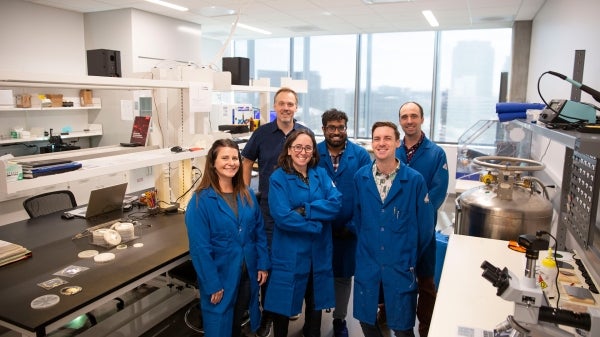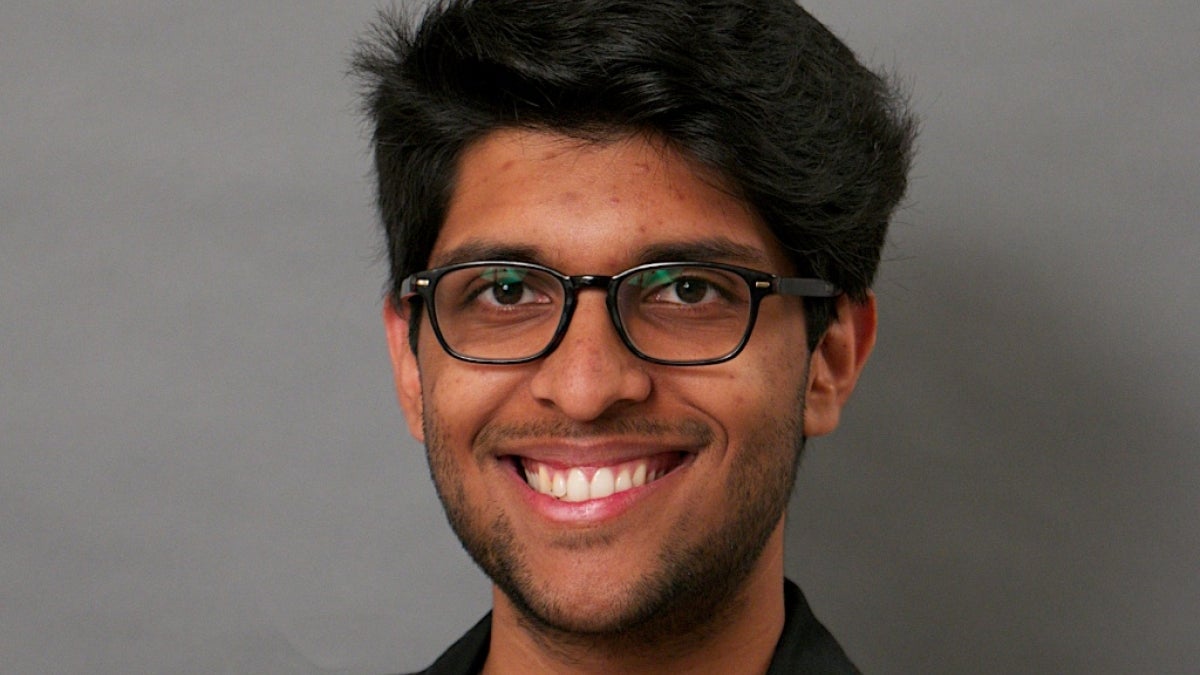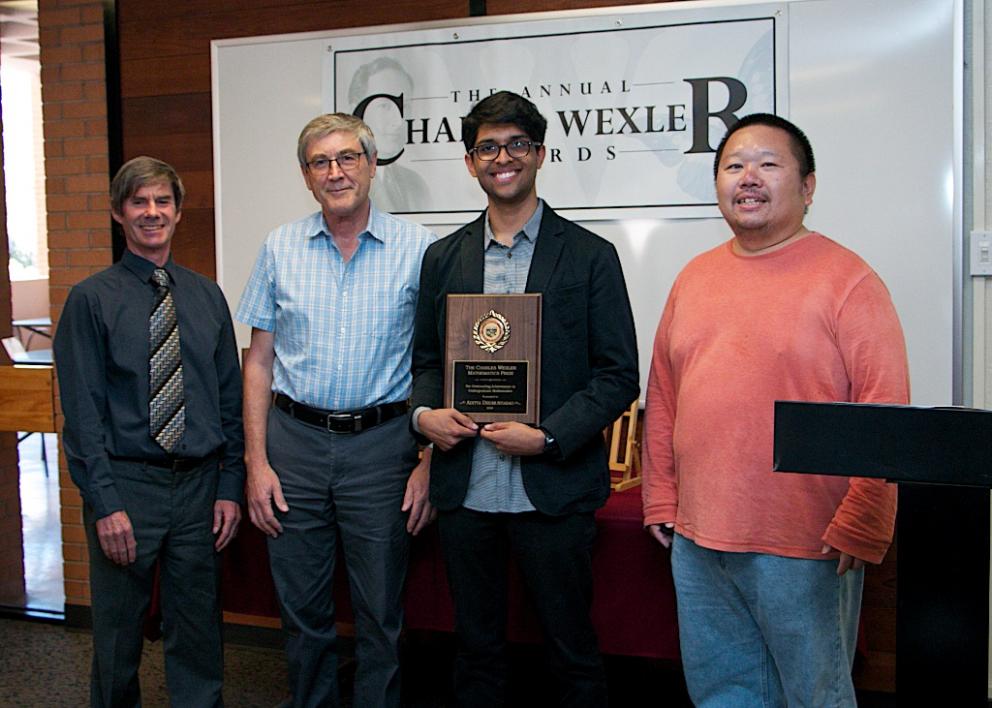Editor's note: This is part of a series of profiles for spring 2016 commencement. See the rest here.
Aditya Dhumuntarao, a Barrett, the Honors College student who will be graduating in May with dual bachelor’s degrees in mathematics and physics, has earned top honors in both majors. He earned the top award for an undergraduate in each mathematics and physics — the Charles Wexler Mathematics Prize, and the Outstanding Physics Undergraduate Award. He was recently awarded a National Science Foundation (NSF) Graduate Fellowship, and is also the recipient of the inaugural Origins Project Undergraduate Research Scholarship.
Originally from India, Dhumuntarao plans to attend the University of Cambridge in the fall to complete the one-year Mathematics Tripos (Part III) program in the Department of Applied Mathematics and Theoretical Physics before returning to the States and continuing his graduate studies at the University of Minnesota.
He believes the only three things that students need to succeed are passion, ambition and mentors.
“Passion provides a fierce interest in what you want to learn, but it's ambition to succeed that realizes your goals,” he explained. “While the first two are my most important personal principles, the real value of my undergraduate degree comes from my connection to my mentors at ASU, professors Wenbo Tang, Eric Kostelich, Cecilia Lunardini, Maulik Parikh and Paul Davies.”
Dhumuntarao understands that as a freshman or sophomore, it’s easy for students to feel that professors are the enemy or disinterested towards their education.
“In fact, the opposite is true, and I learned that as an ASU student,” he said. “My mentors genuinely wanted to help me, and each, in their own way, provided me with support, advice, and assistance during my undergraduate life. I honestly would not be here if it were not for their efforts and well wishes.”
His plans for the summer include staying in England and starting a research project with the physics faculty at Cambridge. In his downtime, he'd like to pursue personal projects, including learning French, taking courses on machine learning and studying some neuroscience.
Aditya Dhumuntarao (with plaque) receives the Charles Wexler Mathematics Prize, with (from left) School of Mathematical and Statistical Sciences director Al Boggess, professor Paul Davies and professor Wenbo Tang.
Dhumuntarao answered some questions about his experience at Arizona State University.
Question: What was your “aha” moment, when you realized you wanted to study the field you majored in?
Answer: I was originally a mechanical engineering and computer science student. However in the second semester of my sophomore year, I attended a physics colloquium titled, "How to Escape from a Black Hole" by my current research adviser, Maulik Parikh. This was an extremely formative moment for me. I always wanted to study mathematics and physics because their predictive and descriptive ability are, in my opinion, quite beautiful. I walked out of that lecture hall wanting to study physics and mathematics, and switched my major almost immediately afterwards.
Q: Why did you choose ASU?
A: During the senior year of my high school, I went on a class field trip to tour Barrett, the Honors College. On the field trip, I also had the chance to tour the majority of the ASU campus. I enjoyed the atmosphere at ASU and immediately realized that I wanted to pursue my undergraduate here.
Q: What’s the best piece of advice you’d give to those still in school?
A: As president of the ASU chapters of the Society of Physics Students and Sigma Pi Sigma, the most common questions I address are: “How do I involve myself in research? Does outreach matter? And am I able to keep up with graduate courses?”
Research and outreach are key, both for your undergraduate and beyond to graduate school. While conducting research places you at the forefront of your field, outreach also is a necessary part of your degree. In my case, promoting science, science education and science communication were invaluable to my desires to attend graduate school. In fact, the National Science Foundation Graduate Research Fellowship Program asked how I have positively influenced my science community. My involvement with the ASU Physics Department and TEDxASU were essential aspects of my application.
Additionally, take graduate courses! Often times, the most interesting subjects or research may only be pursued after you learn an advanced topic in depth. Graduate classes are extremely helpful in this manner because graduate students often commit to an adviser after they have taken the necessary courses. Studying subjects at the graduate level not only teaches you the subject, but also important methods of study. In my case, I decided to take on graduate studies in general relativity and quantum field theory before I worked on my honors thesis, which involved studying black holes — and that's pretty neat if you ask me.
If you are feeling nervous about talking to professors, joining a club or enrolling in a graduate course, just remember: Stay ambitious and you can achieve anything.
Q: What was your favorite spot on campus, whether for studying, meeting friends or just thinking about life?
A: My favorite spot on campus has to be the club room for the Society of Physics Students. I have had many fond memories there both when I was studying, or just relaxing with friends.
Q: What are your plans after graduation?
A: I have been admitted to both the University of Minnesota and the University of Cambridge! I will join and complete the Mathematical Tripos (Part III), a one-year program, at the Department of Applied Mathematics and Theoretical Physics at Cambridge before I return to the States and resume my graduate studies at the University of Minnesota.
During this summer, I am planning on staying in England and starting a research project with the physics faculty at Cambridge. In my downtime during the summer, I'd like to pursue a few personal projects such as learning French, reading history, taking courses on machine learning, brushing up on my linguistics and studying some neuroscience.
Q: If someone gave you $40 million to solve one problem on our planet, what would you tackle?
A: Exploring space. While this answer seems self-contained, I chose space exploration for a variety of reasons. Other than “Star Trek: The Next Generation” being a major impact in my life, space exploration seeds the development of technologies that are invaluable to humankind. For example, technologies such as Velcro and singular advancements in water filtration can be attributed to NASA's involvement. If we want to tackle climate change, global food shortages, and improve the standards of living for all humankind — I believe the answers lie in space exploration.
More Science and technology

ASU professor honored with prestigious award for being a cybersecurity trailblazer
At first, he thought it was a drill.On Sept. 11, 2001, Gail-Joon Ahn sat in a conference room in Fort Meade, Maryland.…

Training stellar students to secure semiconductors
In the wetlands of King’s Bay, Georgia, the sail of a nuclear-powered Trident II Submarine laden with sophisticated computer…

ASU startup Crystal Sonic wins Natcast pitch competition
Crystal Sonic, an Arizona State University startup, won first place and $25,000 at the 2024 Natcast Startup Pitch Competition at…

